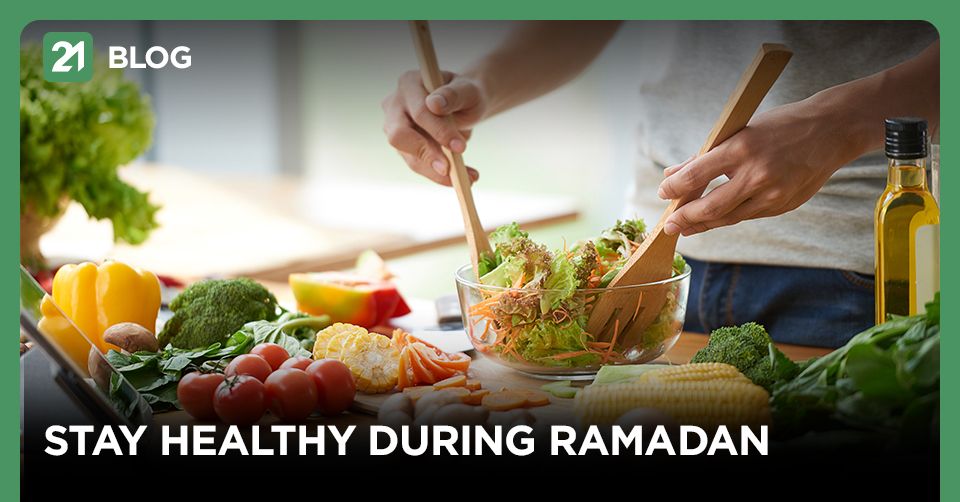How To Stay Healthy During Ramadan

How To Stay Healthy During Ramadan
The most anticipated month in Islam is just around the corner. Muslims all over the world have started preparing for it. Ramadan is one of the holiest months in Islam and the ninth month in the Islamic calendar.
Ramadan brings practices that are followed staunchly by all practicing Muslims worldwide. Muslims are required to fast for a specific number of times, depending on the city they reside in.
The holy month of Ramadan brings with it many spiritual and health benefits. Fasting from dawn till dusk, and refraining from sinful acts, are one of the essential practices of Ramadan. However, it would help to keep a healthy diet to keep yourself fit and well-nourished. With proper nutrients and a balanced calorie count, it is possible to improve the overall condition of your health.
Pakistan’s largest Real Estate network, Agency21 International, provides a few handy tips for you to maintain a healthy lifestyle during Ramadan.
How is fasting beneficial for the body?
Fasting gives numerous benefits to the body. Experts claim that the human body is made to fast for extended periods, thus reducing the possibilities of life-threatening diseases in the body.
You may feel weak and lethargic due to low blood sugar and low salt intake during your fasts. Despite that, fasting (the right way) can help your body build its health in a matter of days. The following are a few ways fasting improves one’s well-being:
- Eliminates toxins from the body
- Improves blood pressure
- Balances cholesterol levels
- Regenerates cells of your immune system
- Enhances brain activity and neurological function
- Reduces obesity and improves mental health
It is important to note that fasting does not give you many health benefits on its own; you have to take specific steps to make the most out of it.
Following are 5 helpful tips you can practice to achieve your health goals!
1. Keep yourself extremely hydrated!
We cannot emphasize this point enough. It is imperative that you keep your water intake high between Iftar and Suhoor. Consuming 8-12 glasses of water should be the norm during Ramadan. One of the reasons you feel weak during Ramadan is because of dehydration. To avoid further fatigue, hydrate yourself as much as you can.
2. Tone down the fried stuff!
Oily and greasy food seems exceptionally tempting when you have not eaten for more than half of the day. We know that you have your eyes on those Samosas and Pakoras, but it is in your own best interest to steer clear of them. Not only will they make you gain weight, but they will also increase your cholesterol levels, leaving you feeling extremely unhealthy.
It is better to opt for healthier alternatives like fiber-rich foods, e.g., vegetables, fruits, brown rice, etc.
We recommend consuming foods high in water content, e.g., watermelon, cucumber, papaya, spinach, etc. Essentially, one should try to incorporate proteins, vegetables, carbs, minerals, and vitamins in their daily diet to benefit the most from fasting.

Say no to fried stuff
3. Cut down on caffeinated beverages and sugars
This is unfortunate news for our coffee lovers out there, but studies reveal that caffeine leaves the body dehydrated as there will be a loss of fluids. However, this research has many conflicting findings. It is revealed that having limited cups of coffee post-Iftar and pre-Suhoor is alright. You can even opt for less caffeinated drinks like tea.
Similarly, it is important to cut down on sugars as well. As saddening as it sounds, sugars are one of the main reasons why people gain weight during Ramadan. Sugars cause imbalances in the insulin hormone, which further support storing fats in the body. It is best advised to indulge in sweets a few hours after Iftar.
4. Take your Suhoor meals seriously!
People often miss out on their Suhoor meals, for it is difficult to wake up in the middle of the night; however, Islam gives utmost importance to this particular meal because of its numerous benefits. Making the right choices in your meals is essential. This means that you should avoid the foods that make you hungry, thirsty and do not give you enough nutrients to survive the day.
Essentially, you should consume the foods during Suhoor according to your body’s needs. For example, complex carbohydrates, such as beans and whole grains, provide glucose (blood sugar) which will, in turn, reduce fatigue throughout the day.
Furthermore, proteins are the key to staying full through the day. The reason for it is that the human body digests proteins more slowly than other foods, thus making you energetic and healthy for the day.
5. Don’t miss out on your Workouts
Contrary to what you might believe, exercising during Ramadan is completely alright. If you have been working out before Ramadan, experts recommend that you continue it during Ramadan as well, or else there is a probability of losing muscle mass.
We suggest light and moderate workouts during your fast but keep in mind that high-intensity workouts will only weaken your immune system. Consider a doctor’s opinion if working out makes you feel weak or if you have any underlying disease.
Working out during Ramadan is the perfect way to maintain your figure. The two prescribed timing for workouts is an hour or two before Iftar and after Iftar.

Don’t miss out on your Workouts
What We Conclude
Ramadan is one of the holiest months in the Islamic calendar; therefore, our main focus should be on prayers and becoming better, more pious Muslims. Fasting helps the human body fight potential diseases, thus proving its scientific benefits as well.
You should ignore your cravings and avoid indulging in unhealthy foods to avail of these benefits. Even if it is difficult to exercise and maintain a proper workout routine, it is advised that we remain active and go about the day as we usually would.

